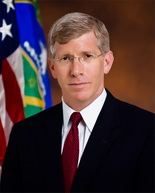forum
library
tutorial
contact

Between the Beltway and the PNW
by Editorial BoardThe Oregonian, October 31, 2013
|
the film forum library tutorial contact |

|
Between the Beltway and the PNWby Editorial BoardThe Oregonian, October 31, 2013 |
The Oregonian, Oct. 27, on DOE supervision of BPA's hiring practices:

The No. 2 person at the sprawling U.S. Department of Energy in Washington, D.C. threw a shockwave through the Northwest last week when he issued a memo tightly controlling the personnel and legal functions of the Bonneville Power Administration. But Deputy Secretary Daniel Poneman gets to do that, especially in light of DOE's findings this year that BPA had gone out of its way to contravene federal law and discriminate against military veterans in hiring - and then, perhaps worse, retaliate against those who dared to report it.
Poneman's directives are the parental equivalent to a time-out for the Portland-based agency. To the degree that they narrowly focus on human resources practices at BPA, they make sense: BPA, as it proceeds with an earlier directive from the DOE's inspector general to deconstruct hundreds of its hirings and right some wrongs, must now show measures are taken within the agency to ensure discrimination cannot happen again. Moreover, it must do so under direct DOE supervision and file a progress report in six months. Fair enough. DOE to BPA: Quit defying me, obey the law and act right.
But Poneman's surprise memo also called for BPA's extensive legal staff to report directly to DOE's general counsel, in Washington, D.C. And that sent the equivalent of a lit cherry bomb rolling under the dinner table. It is unclear how, precisely, this will or could work. Almost all decisions made by BPA's administrator are open to legal challenge, whether from aggrieved utilities, tribes, conservationists, commercial fishers, wind developers, property owners, counties or states. That the legal context of Northwest concerns would be extruded through DOE's Beltway-based legal staff seems a reach.
Minimally, referring legal work out for another layer of review raises questions about cost and lost time. BPA, for all its faults, is more market-responsive than most federal agencies, as it is underwritten not by taxpayers but with revenue raised by its marketing and sale of electricity generated at 31 dams in the Columbia Basin. It should be enough that Poneman demand documentation from BPA that the agency complies with federal laws and makes decisions that are consistent with DOE policies. Cost escalation at BPA in the wake of DOE's investigation could come to bear directly upon ratepayers, as a BPA review of previous hires already is projected by the inspector general to require at least $3 million.
But the real significance of DOE's legal oversight extends beyond money to control: whether BPA can remain an agency that makes its decisions independently, with Northwesterners first in line. We are not among those who have decided Poneman has thrown down the gauntlet and revealed intentions by DOE to take over BPA. But the growing perception that BPA is on a slippery slope -- that DOE's probe and Poneman's latest memo mark just the beginning of Beltway micromanagement - is something that Poneman must bluntly address.
In the opening of an otherwise D.C.-rules memo, Poneman took a shot at it when he wrote: "(DOE) ... remains committed to supporting BPA and the interests of those it serves, to assuring fulfillment of BPA's statutory obligations -- including to provide cost-based power to customers ... and to continuing BPA's longstanding traditions of tackling critical energy and environmental issues facing the organization and the region." That last part, especially, suggests DOE understands what BPA has been up to all these years. But a legible process by which two legal staffs might confer and arrive on common ground -- with reasonable speed and thrift -- needs definition. Meanwhile, Poneman's promise that he and others will in six months "review the progress" of a conjoined BPA and DOE legal team does little to tamp down fears there really is a slippery slope.
Oregon Sen. Ron Wyden, who chairs the Senate Energy and Natural Resources Committee, told The Oregonian's editorial board on Friday that he'd talked by phone with Poneman on Friday morning and underscored his concern that DOE would encroach a longstanding Northwest institution. Wyden said Poneman "felt very strongly" that DOE's actions were exclusively limited to concerns about hiring and compliance with federal law. And Wyden repeated his declaration about potential DOE encroachments: "Not on my watch."
Good. But it doesn't mean the next several months will be without hand-wringing, inter-agency inefficiencies, new expenses to be shouldered by ratepayers and more fears of DOE encroachment.
The immediate task for BPA is to fix a mess of its own creation and endure its regrettably earned time-out. The immediate task for Wyden and the Northwest congressional delegation, meanwhile, is to continue signaling Poneman about where the Beltway ends and the Northwest begins.
learn more on topics covered in the film
see the video
read the script
learn the songs
discussion forum
